Brandon Johnson is encouraging corruption
"Ethics is about how we equitably distribute government in a way that everybody can feel proud of," the mayor said in response to a question about his track record on ethics reform.
Chicago government has a corruption problem.
And the Chicago Tribune’s Jake Sheridan asked Mayor Brandon Johnson about it at a press conference this week.
The mayor’s response was stunning.
Johnson’s remarks on ethics reform
“There’s no doubt that Chicago has long struggled with ethics [in] politics,” Sheridan said.
“What do you think your track record in achieving ethics reform is? What are some highlights? What’s the overall tenor of that?”
Here are Johnson’s full remarks (emphasis added):
Well, you know, look you’re right that there’s no secret that this government has not been as close to the community as it has needed to be. And that’s why I’m very proud of the fact that we’re moving with expediency around what co-governance looks like.
One of the things that I’m actually very proud of is the fact that, you know, our equity chief, Carla Kupe, who is working across city departments to ensure that we’re distributing services in an equitable way. And we’re seeing that in how [Streets and Sanitation] shows up, the way all of our departments are showing up. The way the Department of Transportation is showing up. It’s important that people understand and know what our motivations are. The way our [Buildings Department] and Water Department is showing up for folks.
The ethics or ethos of our government can’t just be simply mired in our conversation around the potential for corruption. I find that to be a very puerile sort of approach towards how we talk about ethics. Ethics is about how we equitably distribute government in a way that everybody can feel proud of. And if you look across this podium you can see the diversity of our city, our commitment to bringing transformation in neighborhoods.
So if you’re asking me how I feel, you know, about how we are ethically responding with the full force of government, I feel that we’re moving in the right direction. You know we have a diverse administration. Women, Black, brown, white, Asian, some folks that are seasoned, we got new folks coming in, as you just heard we have an approach towards budgeting that’s going to be far more expansive than we’ve ever had. Look there’s nothing surreptitious about this administration. So we’ll continue to lead in that way.
In talking about “ethics reform,” Sheridan is clearly asking the mayor about his efforts to reduce corruption.
But Johnson’s words reflects a lack of interest in pursuing policies to reduce corruption.
And his actions have shown more than just ambivalence, but outright hostility toward ethics reform.
Johnson’s record on ethics reform
Johnson has not led the passage of a single piece of anti-corruption legislation during his time as mayor.
And he’s actively blocked other elected officials’ efforts to do so.
His failures on ethics reform include, among other shortcomings, working to kill an ordinance restricting lobbyists’ political giving, blocking investigators as part of the “gift room” fiasco, and failing to recuse himself from negotiations with his former employer and largest campaign contributor.
Blocking simple ethics reforms
Last year, Johnson’s administration actively worked to kill a simple ethics change that would have enforced an existing restriction on lobbyists’ political contributions.
Under a 2011 executive order, Chicago city lobbyists are barred from giving money to mayoral campaign funds. But in April 2024, the Chicago Board of Ethics found it was unable to punish several registered lobbyists who violated that order – including one who contributed $2,000 to Johnson’s campaign – because the board lacked legal authority to enforce it.
So the Board of Ethics wrote a letter to City Council and the mayor asking them to pass an ordinance to fix the loophole. And Ald. Matt Martin, 47th Ward, introduced an ordinance to do just that.
But Johnson ally Ald. Byron Sigcho-Lopez filed a motion to delay the vote on that ordinance. And the administration worked the phones to whip votes against it, according to the Better Government Association.
“I spoke with the mayor’s office last Wednesday,“ Martin said at the time.
“They communicated their position. I asked if there was anything that we could change – one thing or a series of things in the ordinance that would change their mind and cause them to support the ordinance. They said, ‘No.’”
Johnson’s response to reporters about this issue ended up being an auspicious sign of things to come.
City Council ultimately passed the ordinance above Johnson’s objections.
As Sheridan mentions in his Tribune story, officials in Johnson’s administration later discussed ousting Martin as the chair of the Ethics Committee.
The gift room controversy
Johnson’s infamous “gift room” controversy was another example of the mayor’s office stonewalling additional oversight for no good reason, further eroding trust in city government.
Here’s how it happened, as detailed by an Office of Inspector General (OIG) report.
Chicago’s Government Ethics Ordinance prohibits city officials, including the mayor, from accepting gifts over $50. One exception is that officials may take gifts that are “accepted on behalf of the City.” These gifts are supposed to be approved in advance by the Board of Ethics, then promptly reported to the Board of Ethics and city comptroller after they are received. The comptroller is then supposed to add these gifts to the city’s inventory.
But that’s not what was happening.
Instead, under an “unwritten arrangement” between the Board of Ethics and the Mayor’s Office that has been in place since 1989, the mayor can completely disregard the law. Under this arrangement, the mayor’s office simply makes a publicly available log book of the gifts they receive, which is kept on the fifth floor of City Hall.
No prior approval of gifts. No reporting to the Board of Ethics. And no reporting to the city comptroller to put these gifts in the city inventory. According to the Board of Ethics, this informal arrangement was communicated to mayoral staff during ethics trainings.
So the OIG went undercover last June to test access to the “public” log of mayoral gifts. An investigator showed up at City Hall posing as a member of the public and asked to see it. But the mayor’s staff denied the request and directed them to file a Freedom of Information Act request instead. At this point not only was the mayor’s office violating the plain text of the ethics ordinance, but they were also violating the informal, unwritten arrangement put in place to subvert that ordinance.
So the OIG filed a Freedom of Information Act request for the mayoral gift list – again without revealing their identity. The mayor’s office didn’t respond. Only when the OIG issued a formal request was the log finally produced.
And here’s what they found: Hundreds of luxury gifts, including Hugo Boss cuff links, a personalized Mont Blanc pen, a Gucci tote bag and crossbody bag, and much more. Notably absent from the list was any record of gifted travel, entertainment, or meals.
Where were these gifts stored? The log showed some were in a mysterious “gift room.” Others were stored in the mayor’s private office. One entry reads: “Bottle of Uncle Nearest 1856 Premium Aged Whiskey–location: Room 507” (the mayor’s office).
The OIG then tried to inspect the gift room. They showed up at City Hall unannounced. The mayor’s office refused, bringing in the city’s Department of Law to block access.
A critical flaw in Chicago’s governance structure was on display here. The Law Department was working purely on behalf of the mayor, rather than the public. Just read this infuriating passage from the OIG: “Following that denial, OIG engaged in further conversations with the Department of Law (DOL) regarding access to the gift room. Ultimately, DOL—apparently representing the mayor in opposition to the OIG—communicated that OIG would not be granted access to the Gift Room. OIG was therefore unable to inspect the manner in which gifts are stored in the Gift Room as stated in the gift log, or to review controls around access to the gift room.”
Remember that Chicago requires all city agencies to cooperate with the OIG. City ordinance specifically states: “Each department’s premises, equipment, personnel, books, records and papers shall be made available as soon as practicable to the inspector general.” But instead of complying, the mayor’s office doubled down. The city’s lawyers persisted in denying the OIG physical access to the Gift Room.
After months of stonewalling, the mayor’s office finally responded: Yes, they’ll allow inspections – but only by appointment.
This episode wasn’t just a one-off. It’s part of a pattern from Johnson’s administration.
In February, the OIG issued a memo accusing the city's Law Department of repeatedly and intentionally interfering in investigations, alleging the department “selectively acts in opposition to OIG’s investigative work when OIG’s work may result in embarrassment or political consequences to city leaders.”
This obstruction included withholding important city documents based on attorney-client privilege, demanding to sit in on investigative interviews conducted by the OIG, and delaying enforcement of OIG subpoenas.
Refusing to recuse himself from contract negotiations between his former employer and largest campaign donor
Before becoming mayor, Brandon Johnson taught for four years at Chicago Public Schools, then left to work for the Chicago Teachers Union as a paid organizer and lobbyist. The CTU and its associated entities were Johnson’s largest campaign funders in his run for mayor.
But Johnson still remains on “union leave” from the classroom. That means he has continued to accrue seniority in the schools, and could return to a six-figure position. Due to a related loophole, he is also set to receive a teacher pension worth up to $5.5 million despite working just four years in the classroom.
An internal CPS memo from June 2023 revealed concerns about Johnson’s employment status with the district leading to conflicts of interest.
In the memo, CPS Chief Talent Officer Ben Felton wrote he was concerned about a potential conflict of interest in the mayor’s dealings with CPS due to his employment status, writing that he raised the issue with then-Deputy Mayor of Education Jen Johnson (also a former CTU official) four times between May and June 2023.
The mayor not only declined to resign his position, he heavily involved himself in negotiations between CPS and CTU.
Fixing Chicago’s corruption problem
“Chicago is not the most corrupt American city,” Studs Terkel once said.
“It’s the most theatrically corrupt.”
He’s right. Chicago is renowned worldwide for its culture of corruption. And we earned that reputation. But a flawed understanding of Chicago corruption can lead to the wrong prescriptions for how to fix it.
Here are three things worth knowing about corruption in Chicago government:
Chicago is probably not the most corrupt American city, based on publicly available data. But our levels of corruption are still way too high.
Chicago City Council is the most corrupt legislative body in America.
Chicago’s anti-corruption solutions have not been sufficient to deal with our corruption problem, as residents’ trust in city government remains abysmally low.
1. Chicago is probably not the most corrupt American city
One of the most surprising findings in our research for The New Chicago Way was that Chicago is probably not the most corrupt city in America.
Well-meaning critics of Chicago corruption will cite perennial research from University of Illinois Chicago that dubs Chicago the nation’s “corruption capital.” This research shows that since the Department of Justice started collecting data in 1976, Illinois’ northern judicial district, which encompasses the Chicago metropolitan region, has seen a higher total number of federal corruption convictions than any other major judicial district.
But there are three caveats to this data that are often overlooked.
First, federal judicial districts are too rough a proxy for cities. They often capture entire counties outside the city proper and in some cases an entire state. Second, the data include indictments of federal and state government officials, so it’s not necessarily an indication of corruption at the city-government level. And third, the picture changes if you look at more recent history.
Adjusting for some of these issues, we looked at the level of corruption convictions per capita from 2007-2016 across the 15 judicial districts encompassing the 15 most populous U.S. cities. Chicago wasn’t at the top of the list. But we were still too high.
The judicial district encompassing Chicago was home to the fifth-most corruption convictions per capita, behind the judicial districts encompassing Philadelphia, San Antonio, Austin, and Dallas.
This isn’t to say corruption isn’t a huge problem in Chicago. And it’s not to say Chicago was not the most corrupt city in America at one point. But it’s worth noting that we have made some progress in reducing corruption in recent history.
2. Chicago City Council is cartoonishly corrupt
Around 40 Chicago aldermen have been convicted on corruption charges since 1971. This level of corruption is owed to the unique responsibilities gifted to Chicago City Council members. Crain’s Chicago Business and the University of Chicago’s Center for Effective Government explored this issue effectively in their report, “Power Begets Corruption on the City Council.”
3. Chicago’s solutions have not been sufficient to deal with our corruption problem
Johnson’s responses to questions about ethics reform are especially frustrating given his ambitious agenda for increasing city taxes and spending – an agenda that requires more public trust in government.
He should know better.
Chicago voters rejected Johnson’s “Bring Chicago Home” tax increase in part because his administration was not transparent about how they planned to use the new money.
One cannot restore trust in Chicago city government without reducing corruption. And one cannot reduce corruption without reforming city government.
Ald. Martin put it this way last year: “We have a deficit of trust in city government. We’ve had dozens of city officials, including alderpeople, convicted and going to jail in recent decades. We always need to be looking for opportunities to strengthen our ethics rules.”
Chicago Inspector General Deborah Witzburg echoed that sentiment: “The way things have always been is not good enough. And if we’re going to change them, we have to change them.”
They’re right.
How to reduce corruption in Chicago
The most powerful reform to make city government less prone to corruption would be in changing the administrative, parochial responsibilities granted to City Council members. The current ombudsmen-like system encourages the abuse of aldermanic offices for personal benefit. (The council’s lack of term limits, gerrymandered maps, and voter suppression through election timing doesn’t help.) This could be done in part through a voter-approved city charter.
But there are plenty of other shortcomings that could be improved in absence of that big, structural change. Here are four:
Protect the OIG from interference: City Council should pass protections preventing Law Department interference in the OIG’s work. Ald. Matt Martin has introduced an ordinance to do that. It’s currently stuck in the Rules Committee.
Put all the IGs under one roof: Chicago is home to five different inspectors general, including one for the city, one for Chicago Public Schools, one for the Chicago Housing Authority, one for the Chicago Park District, and one for the City Colleges of Chicago. They all have widely different powers, rules, and funding, which makes effective watchdog work difficult. Chicago should consolidate all those offices under one roof akin to the Department of Investigation, or DOI, in New York City. (Note: Despite being home to 60% more people, New York City’s associated federal judicial districts saw 15% fewer corruption convictions than Chicago’s from 2007-2016.)
Overhaul the Board of Ethics: Chicago should overhaul its Board of Ethics in the image of New York City’s Conflict of Interest Board, which provides ethics training, fields ethics complaints, and serves as an ethics counsel. The DOI serves as the board’s investigative arm.
Increase access and transparency in City Council: It’s often impossible for members of the general public to provide meaningful input on legislation prior to City Council votes. The full text of all agenda items should be posted four business days in advance of any City Council meeting, as recommended by the Better Government Association, Civic Federation and the League of Women Voters of Chicago.
Johnson’s attitude toward ethics reform isn’t just failing to fix Chicago’s corruption problem.
It’s making things worse.
These four steps could offer a starting point to change his tune – and if he refuses, a platform for opposing mayoral candidates to run on.

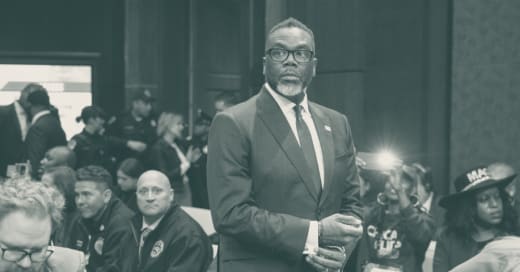



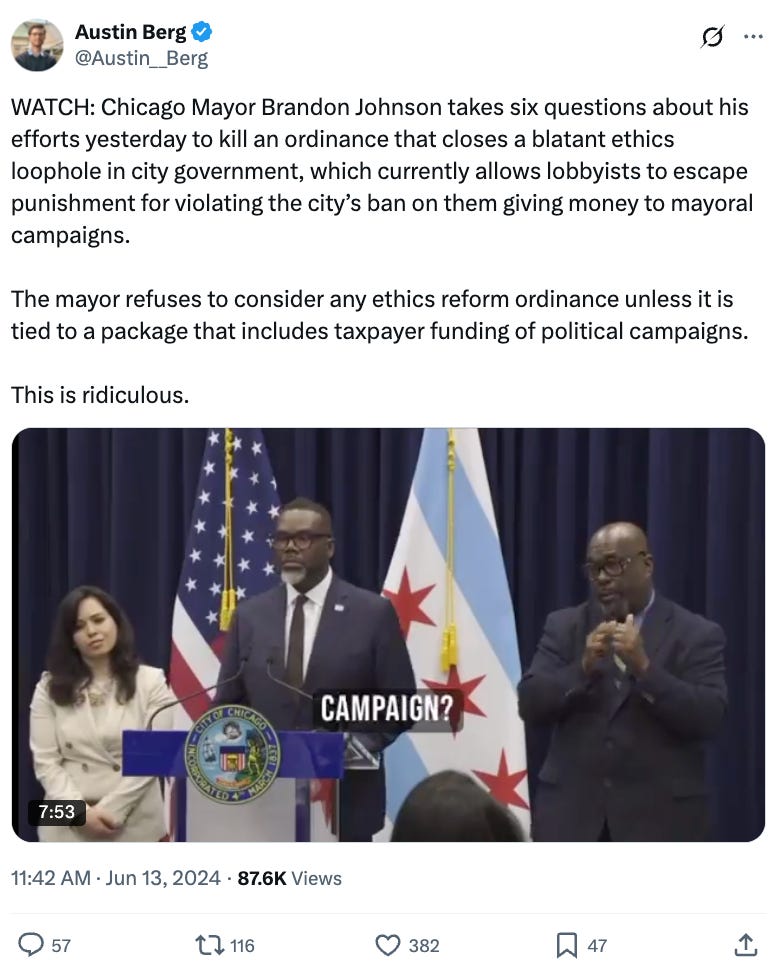
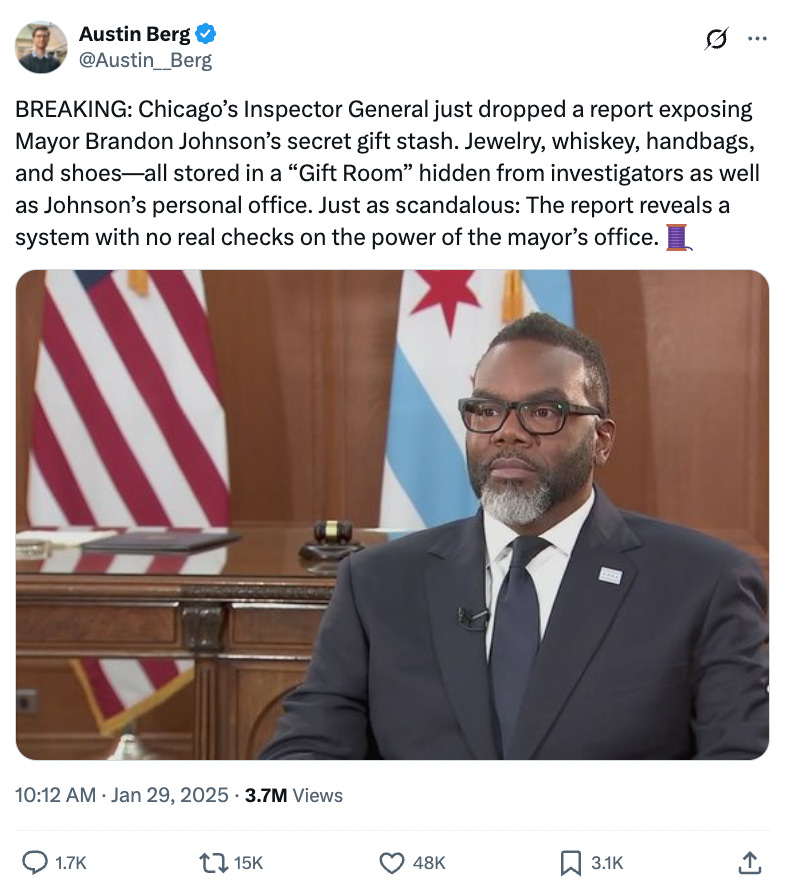
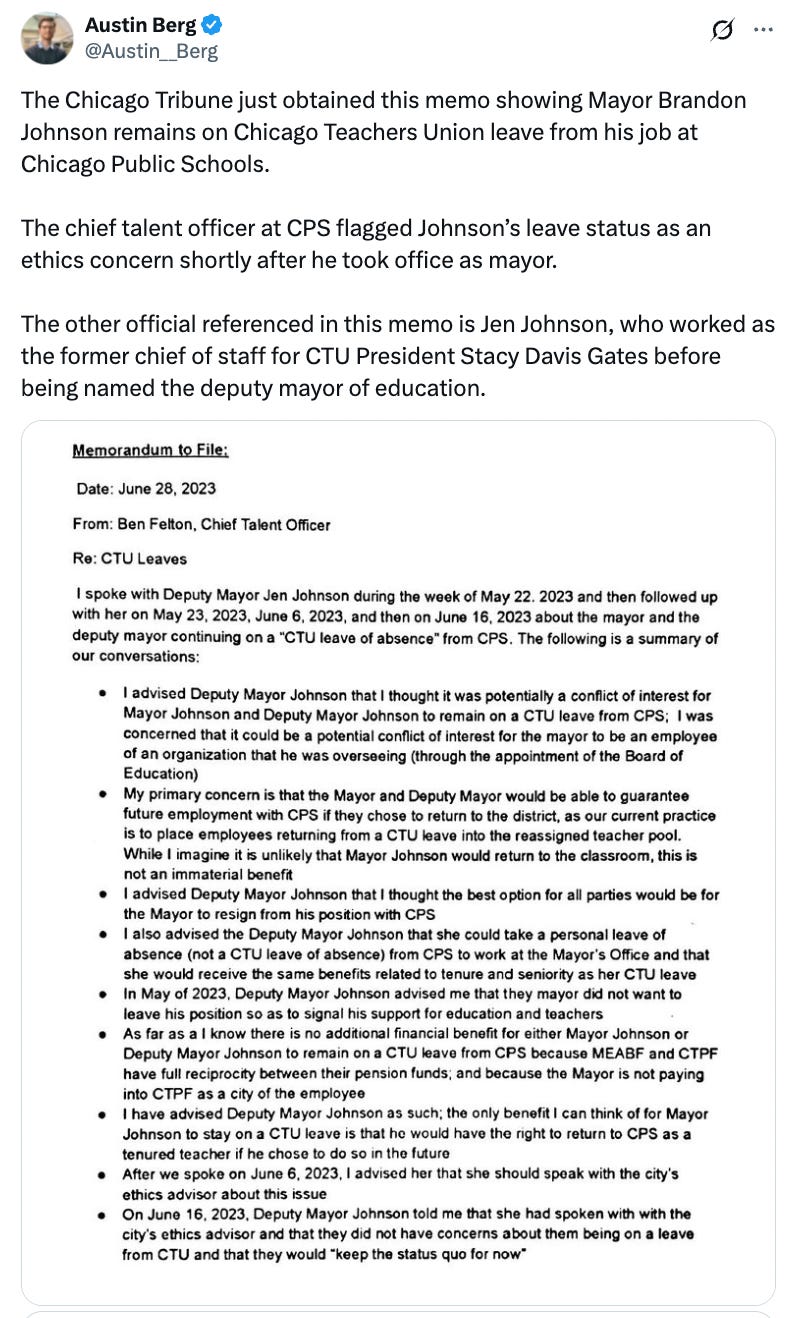
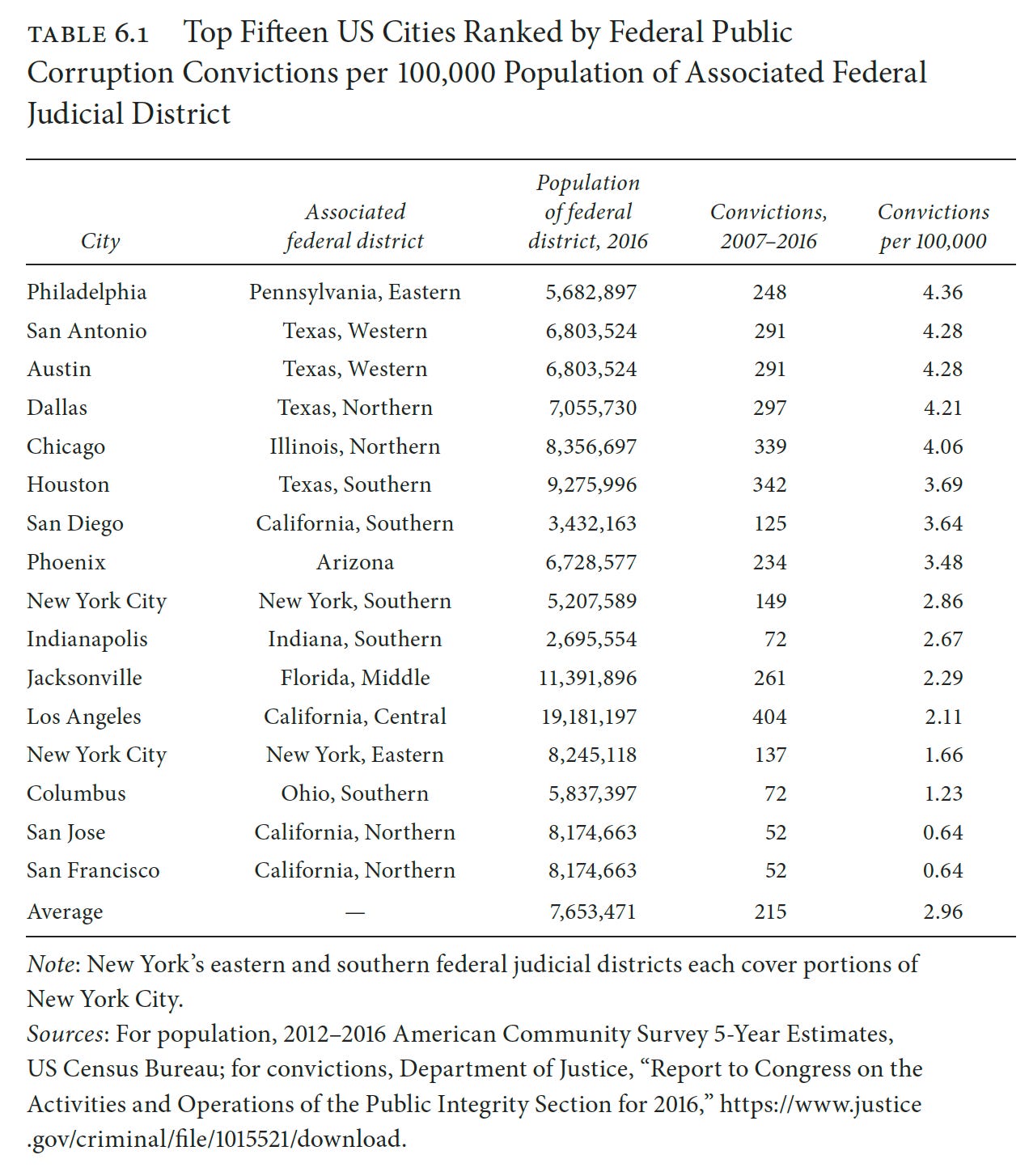
"His failures on ethics reform include, among other shortcomings, working to kill an ordinance restricting lobbyists’ political giving, blocking investigators as part of the “gift room” fiasco, and failing to recuse himself from negotiations with his former employer and largest campaign contributor." This is not a failure of Mayor Johnson, this is one of his major successes!